Nazli Goharian
Learning to Rank Salient Content for Query-focused Summarization
Nov 01, 2024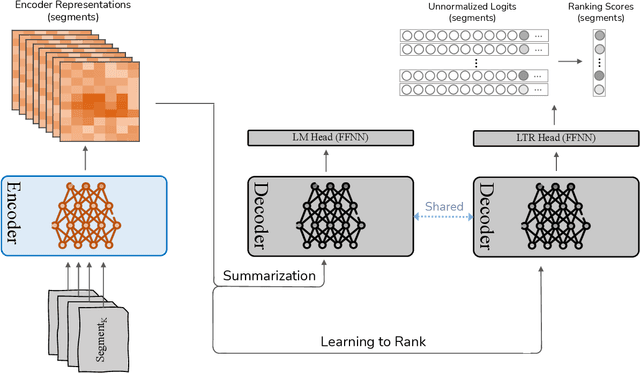
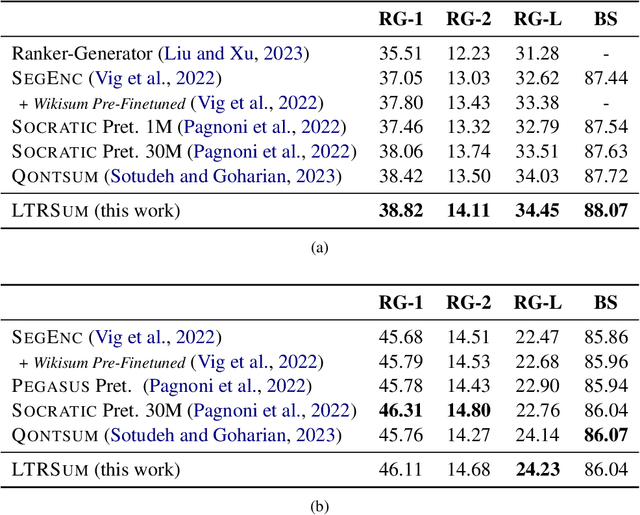
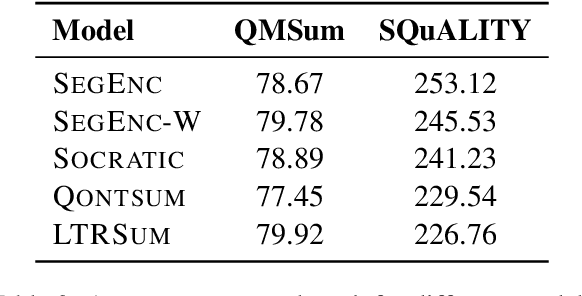
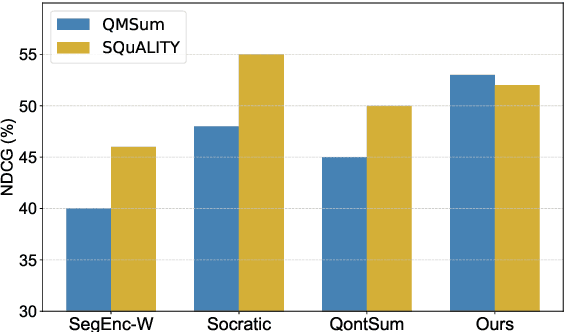
Abstract:This study examines the potential of integrating Learning-to-Rank (LTR) with Query-focused Summarization (QFS) to enhance the summary relevance via content prioritization. Using a shared secondary decoder with the summarization decoder, we carry out the LTR task at the segment level. Compared to the state-of-the-art, our model outperforms on QMSum benchmark (all metrics) and matches on SQuALITY benchmark (2 metrics) as measured by Rouge and BertScore while offering a lower training overhead. Specifically, on the QMSum benchmark, our proposed system achieves improvements, particularly in Rouge-L (+0.42) and BertScore (+0.34), indicating enhanced understanding and relevance. While facing minor challenges in Rouge-1 and Rouge-2 scores on the SQuALITY benchmark, the model significantly excels in Rouge-L (+1.47), underscoring its capability to generate coherent summaries. Human evaluations emphasize the efficacy of our method in terms of relevance and faithfulness of the generated summaries, without sacrificing fluency. A deeper analysis reveals our model's superiority over the state-of-the-art for broad queries, as opposed to specific ones, from a qualitative standpoint. We further present an error analysis of our model, pinpointing challenges faced and suggesting potential directions for future research in this field.
Lexically-Accelerated Dense Retrieval
Jul 31, 2023Abstract:Retrieval approaches that score documents based on learned dense vectors (i.e., dense retrieval) rather than lexical signals (i.e., conventional retrieval) are increasingly popular. Their ability to identify related documents that do not necessarily contain the same terms as those appearing in the user's query (thereby improving recall) is one of their key advantages. However, to actually achieve these gains, dense retrieval approaches typically require an exhaustive search over the document collection, making them considerably more expensive at query-time than conventional lexical approaches. Several techniques aim to reduce this computational overhead by approximating the results of a full dense retriever. Although these approaches reasonably approximate the top results, they suffer in terms of recall -- one of the key advantages of dense retrieval. We introduce 'LADR' (Lexically-Accelerated Dense Retrieval), a simple-yet-effective approach that improves the efficiency of existing dense retrieval models without compromising on retrieval effectiveness. LADR uses lexical retrieval techniques to seed a dense retrieval exploration that uses a document proximity graph. We explore two variants of LADR: a proactive approach that expands the search space to the neighbors of all seed documents, and an adaptive approach that selectively searches the documents with the highest estimated relevance in an iterative fashion. Through extensive experiments across a variety of dense retrieval models, we find that LADR establishes a new dense retrieval effectiveness-efficiency Pareto frontier among approximate k nearest neighbor techniques. Further, we find that when tuned to take around 8ms per query in retrieval latency on our hardware, LADR consistently achieves both precision and recall that are on par with an exhaustive search on standard benchmarks.
QontSum: On Contrasting Salient Content for Query-focused Summarization
Jul 14, 2023



Abstract:Query-focused summarization (QFS) is a challenging task in natural language processing that generates summaries to address specific queries. The broader field of Generative Information Retrieval (Gen-IR) aims to revolutionize information extraction from vast document corpora through generative approaches, encompassing Generative Document Retrieval (GDR) and Grounded Answer Retrieval (GAR). This paper highlights the role of QFS in Grounded Answer Generation (GAR), a key subdomain of Gen-IR that produces human-readable answers in direct correspondence with queries, grounded in relevant documents. In this study, we propose QontSum, a novel approach for QFS that leverages contrastive learning to help the model attend to the most relevant regions of the input document. We evaluate our approach on a couple of benchmark datasets for QFS and demonstrate that it either outperforms existing state-of-the-art or exhibits a comparable performance with considerably reduced computational cost through enhancements in the fine-tuning stage, rather than relying on large-scale pre-training experiments, which is the focus of current SOTA. Moreover, we conducted a human study and identified improvements in the relevance of generated summaries to the posed queries without compromising fluency. We further conduct an error analysis study to understand our model's limitations and propose avenues for future research.
Curriculum-Guided Abstractive Summarization
Feb 08, 2023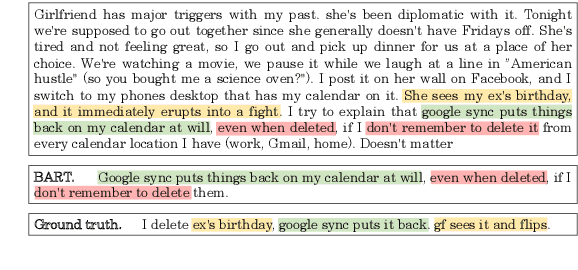
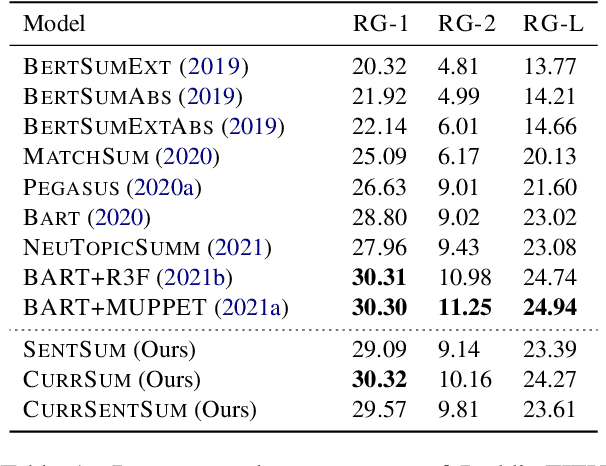
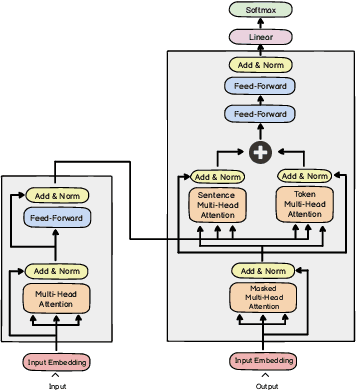
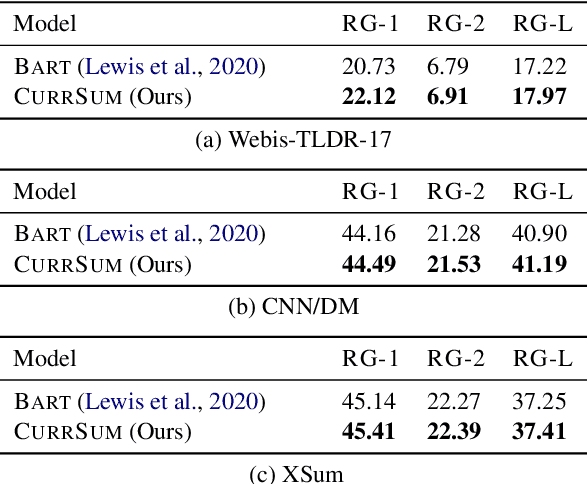
Abstract:Recent Transformer-based summarization models have provided a promising approach to abstractive summarization. They go beyond sentence selection and extractive strategies to deal with more complicated tasks such as novel word generation and sentence paraphrasing. Nonetheless, these models have two shortcomings: (1) they often perform poorly in content selection, and (2) their training strategy is not quite efficient, which restricts model performance. In this paper, we explore two orthogonal ways to compensate for these pitfalls. First, we augment the Transformer network with a sentence cross-attention module in the decoder, encouraging more abstraction of salient content. Second, we include a curriculum learning approach to reweight the training samples, bringing about an efficient learning procedure. Our second approach to enhance the training strategy of Transformers networks makes stronger gains as compared to the first approach. We apply our model on extreme summarization dataset of Reddit TIFU posts. We further look into three cross-domain summarization datasets (Webis-TLDR-17, CNN/DM, and XSum), measuring the efficacy of curriculum learning when applied in summarization. Moreover, a human evaluation is conducted to show the efficacy of the proposed method in terms of qualitative criteria, namely, fluency, informativeness, and overall quality.
Curriculum-guided Abstractive Summarization for Mental Health Online Posts
Feb 02, 2023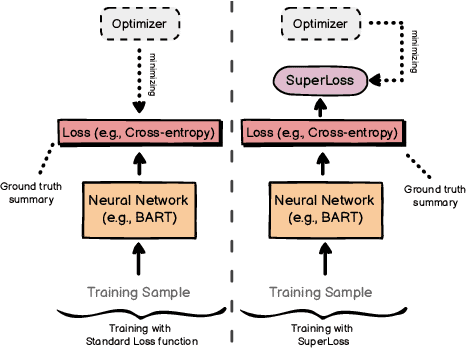

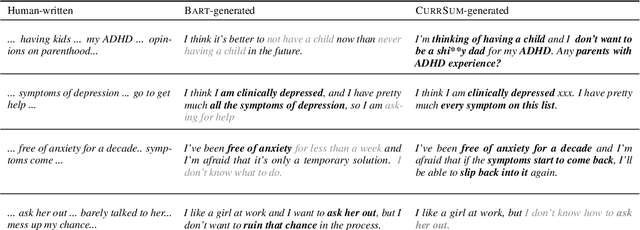
Abstract:Automatically generating short summaries from users' online mental health posts could save counselors' reading time and reduce their fatigue so that they can provide timely responses to those seeking help for improving their mental state. Recent Transformers-based summarization models have presented a promising approach to abstractive summarization. They go beyond sentence selection and extractive strategies to deal with more complicated tasks such as novel word generation and sentence paraphrasing. Nonetheless, these models have a prominent shortcoming; their training strategy is not quite efficient, which restricts the model's performance. In this paper, we include a curriculum learning approach to reweigh the training samples, bringing about an efficient learning procedure. We apply our model on extreme summarization dataset of MentSum posts -- a dataset of mental health related posts from Reddit social media. Compared to the state-of-the-art model, our proposed method makes substantial gains in terms of Rouge and Bertscore evaluation metrics, yielding 3.5% (Rouge-1), 10.4% (Rouge-2), and 4.7% (Rouge-L), 1.5% (Bertscore) relative improvements.
MentSum: A Resource for Exploring Summarization of Mental Health Online Posts
Jun 02, 2022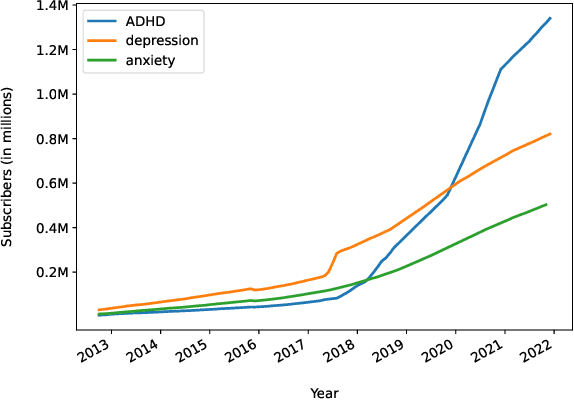
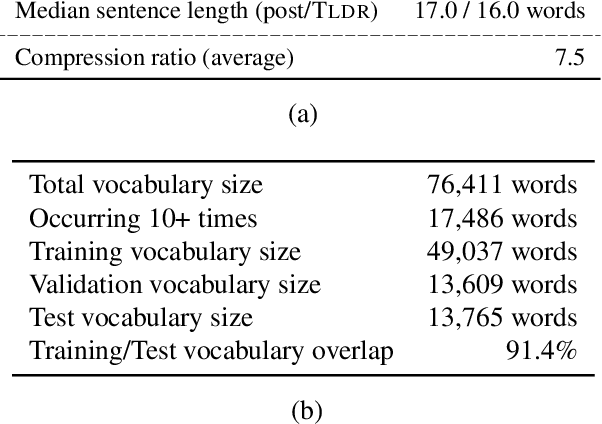
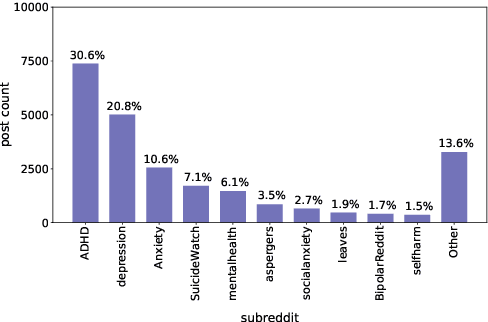
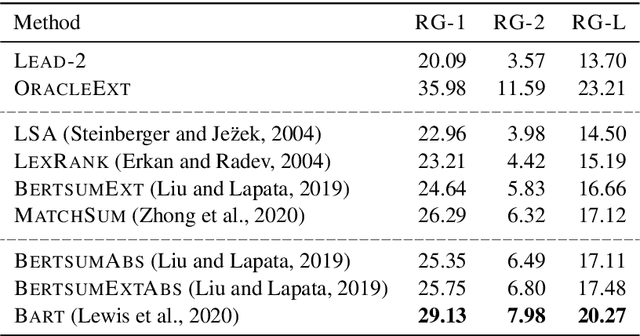
Abstract:Mental health remains a significant challenge of public health worldwide. With increasing popularity of online platforms, many use the platforms to share their mental health conditions, express their feelings, and seek help from the community and counselors. Some of these platforms, such as Reachout, are dedicated forums where the users register to seek help. Others such as Reddit provide subreddits where the users publicly but anonymously post their mental health distress. Although posts are of varying length, it is beneficial to provide a short, but informative summary for fast processing by the counselors. To facilitate research in summarization of mental health online posts, we introduce Mental Health Summarization dataset, MentSum, containing over 24k carefully selected user posts from Reddit, along with their short user-written summary (called TLDR) in English from 43 mental health subreddits. This domain-specific dataset could be of interest not only for generating short summaries on Reddit, but also for generating summaries of posts on the dedicated mental health forums such as Reachout. We further evaluate both extractive and abstractive state-of-the-art summarization baselines in terms of Rouge scores, and finally conduct an in-depth human evaluation study of both user-written and system-generated summaries, highlighting challenges in this research.
TSTR: Too Short to Represent, Summarize with Details! Intro-Guided Extended Summary Generation
Jun 02, 2022

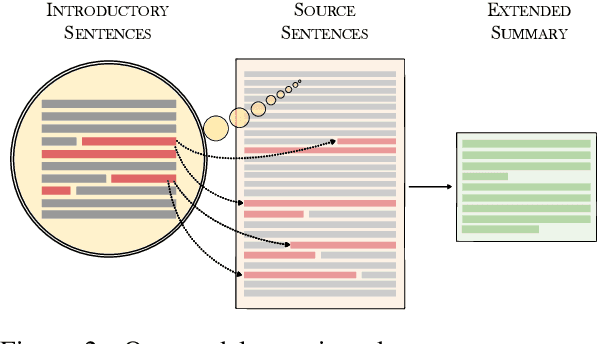
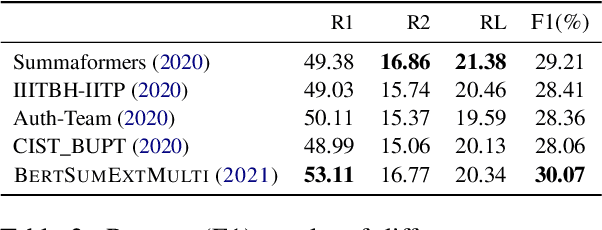
Abstract:Many scientific papers such as those in arXiv and PubMed data collections have abstracts with varying lengths of 50-1000 words and average length of approximately 200 words, where longer abstracts typically convey more information about the source paper. Up to recently, scientific summarization research has typically focused on generating short, abstract-like summaries following the existing datasets used for scientific summarization. In domains where the source text is relatively long-form, such as in scientific documents, such summary is not able to go beyond the general and coarse overview and provide salient information from the source document. The recent interest to tackle this problem motivated curation of scientific datasets, arXiv-Long and PubMed-Long, containing human-written summaries of 400-600 words, hence, providing a venue for research in generating long/extended summaries. Extended summaries facilitate a faster read while providing details beyond coarse information. In this paper, we propose TSTR, an extractive summarizer that utilizes the introductory information of documents as pointers to their salient information. The evaluations on two existing large-scale extended summarization datasets indicate statistically significant improvement in terms of Rouge and average Rouge (F1) scores (except in one case) as compared to strong baselines and state-of-the-art. Comprehensive human evaluations favor our generated extended summaries in terms of cohesion and completeness.
TLDR9+: A Large Scale Resource for Extreme Summarization of Social Media Posts
Oct 05, 2021
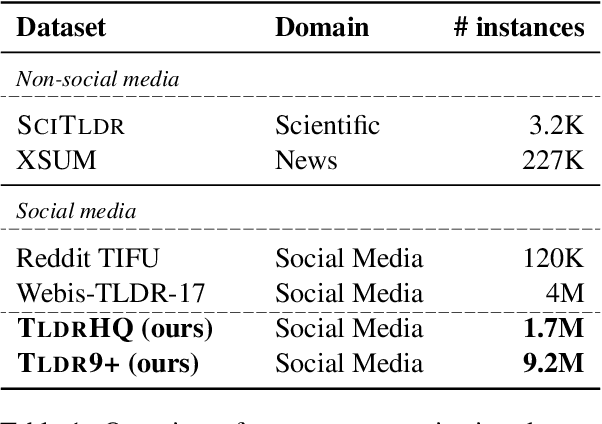
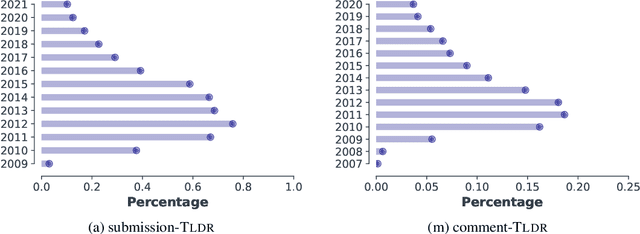
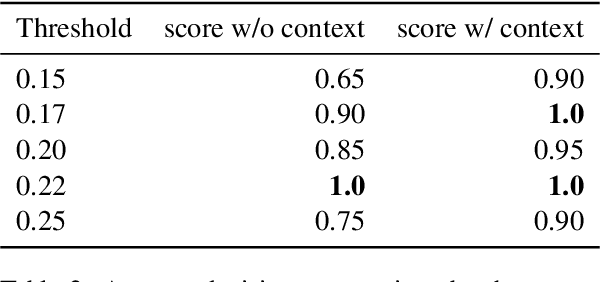
Abstract:Recent models in developing summarization systems consist of millions of parameters and the model performance is highly dependent on the abundance of training data. While most existing summarization corpora contain data in the order of thousands to one million, generation of large-scale summarization datasets in order of couple of millions is yet to be explored. Practically, more data is better at generalizing the training patterns to unseen data. In this paper, we introduce TLDR9+ -- a large-scale summarization dataset -- containing over 9 million training instances extracted from Reddit discussion forum (https://github.com/sajastu/reddit_collector). This dataset is specifically gathered to perform extreme summarization (i.e., generating one-sentence summary in high compression and abstraction) and is more than twice larger than the previously proposed dataset. We go one step further and with the help of human annotations, we distill a more fine-grained dataset by sampling High-Quality instances from TLDR9+ and call it TLDRHQ dataset. We further pinpoint different state-of-the-art summarization models on our proposed datasets.
Simplified Data Wrangling with ir_datasets
Mar 03, 2021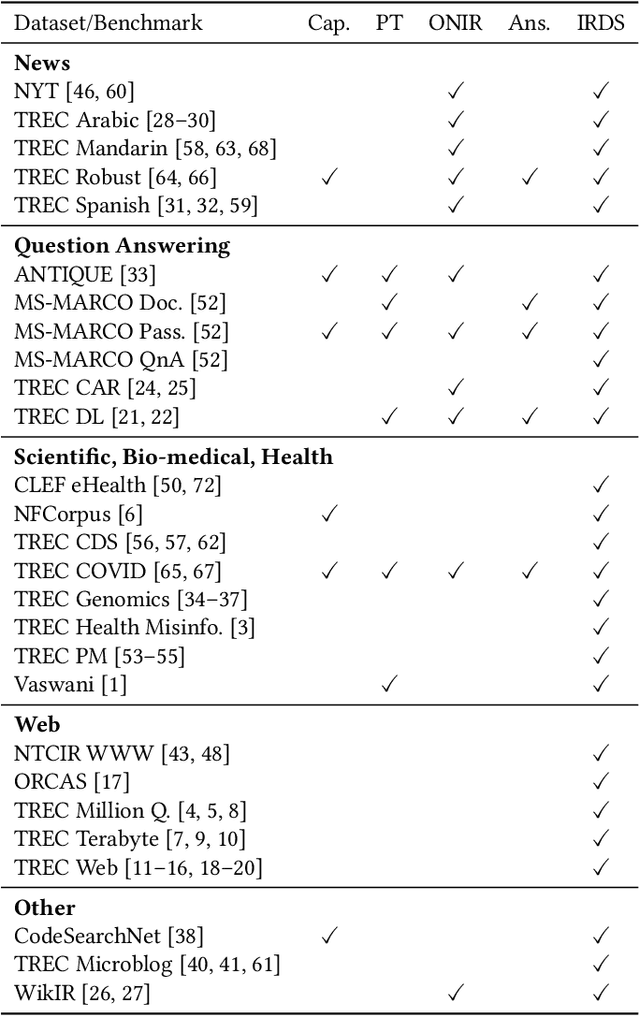
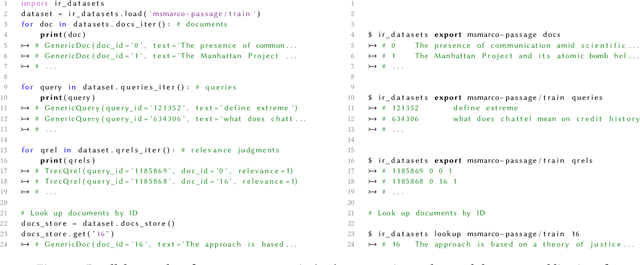

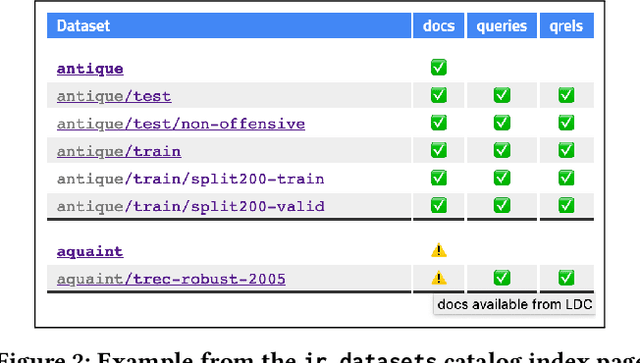
Abstract:Managing the data for Information Retrieval (IR) experiments can be challenging. Dataset documentation is scattered across the Internet and once one obtains a copy of the data, there are numerous different data formats to work with. Even basic formats can have subtle dataset-specific nuances that need to be considered for proper use. To help mitigate these challenges, we introduce a new robust and lightweight tool (ir_datases) for acquiring, managing, and performing typical operations over datasets used in IR. We primarily focus on textual datasets used for ad-hoc search. This tool provides both a python and command line interface to numerous IR datasets and benchmarks. To our knowledge, this is the most extensive tool of its kind. Integrations with popular IR indexing and experimentation toolkits demonstrate the tool's utility. We also provide documentation of these datasets through the ir_datasets catalog: https://ir-datasets.com/. The catalog acts as a hub for information on datasets used in IR, providing core information about what data each benchmark provides as well as links to more detailed information. We welcome community contributions and intend to continue to maintain and grow this tool.
ToxCCIn: Toxic Content Classification with Interpretability
Mar 01, 2021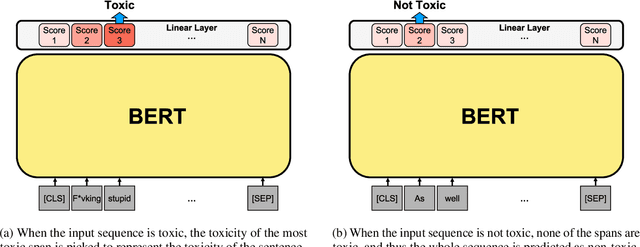

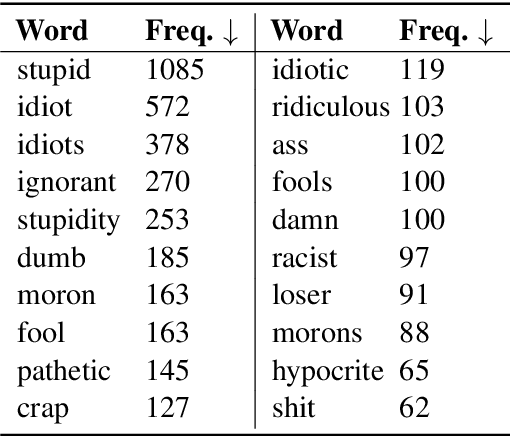
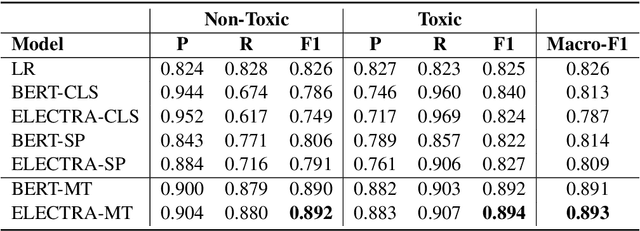
Abstract:Despite the recent successes of transformer-based models in terms of effectiveness on a variety of tasks, their decisions often remain opaque to humans. Explanations are particularly important for tasks like offensive language or toxicity detection on social media because a manual appeal process is often in place to dispute automatically flagged content. In this work, we propose a technique to improve the interpretability of these models, based on a simple and powerful assumption: a post is at least as toxic as its most toxic span. We incorporate this assumption into transformer models by scoring a post based on the maximum toxicity of its spans and augmenting the training process to identify correct spans. We find this approach effective and can produce explanations that exceed the quality of those provided by Logistic Regression analysis (often regarded as a highly-interpretable model), according to a human study.
 Add to Chrome
Add to Chrome Add to Firefox
Add to Firefox Add to Edge
Add to Edge